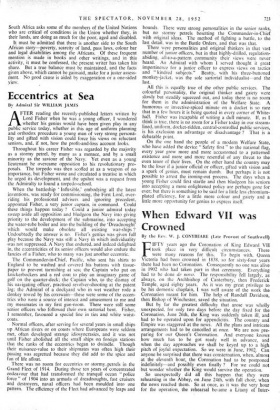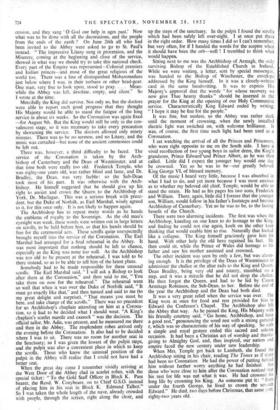When Edward VII was
Crowned
By the Rev. W. J. CONYBEARE (Late Provost of Southwell)
F. IFFY years ago the Coronation of King Edward VII took place in very difficult circumstances. There were many reasons for this. To begin with, Queen Victoria had been crowned in 1838, so for sixty-four years there had been no Coronation. Consequently no one was alive in 1902 who had taken part in that ceremony. Everything had to be done de novo. The responsibility fell largely, as always, on the Archbishop of Canterbury, then Frederick Temple, aged eighty years. As it was my great privilege to be his domestic chaplain, I was well aware of the work the Coronation meant for him. The help of Randall Davidson, then Bishop of Winchester, saved the situation.
But by far the greatest difficulty that arose was wholly unexpected, for only two days before the day fixed for the Coronation. June 26th, the King was suddenly taken ill, and had to be operated upon for appendicitis. The country and Empire was staggered at the news. All the plans and intricate arrangements had to be cancelled at once. We are now pre- paring for our Queen's Coronation. And everyone knows how much has to be got ready well in advance, and when the day approaches we shall be keyed up to a high pitch of joyful expectation. So we were in June, 1902. Can anyone be surprised that there was consternation, when, almost at the eleventh hour, the Coronation had to be postponed indefinitely—and possibly even finally ? For we could not but wonder whether the King would survive the operation.
So unexpectedly did all this happen that they were rehearsing in the Abbey, on June 24th, with full choir, when the news reached them. So at once, as it was the very hour for the operation, the rehearsal became a Litany of Inter. cession, and they sang '0 God our help in ages past.' Now what was to be done with all the decorations, and the people from the ends of the earth ? On June 26th all who had been invited to the Abbey were asked to go to St. Paul's instead. "The impressive Litany sung in procession, and the Miserere, coming at the beginning and close of the service, showed in what way we should try to take this national check. Every part of the Empire was represented—Colonial premiers and Indian princes—and most of the great religions of the world too. There was a line of distinguished Mohammedans just below where I was, in their turbans or other head-gear.
One man, very fine to look upon, stood to pray. . . . Mean- while the Abbey was left, desolate, empty, and silent." So I wrote at the time.
Mercifully the King did survive. Not only so, but the doctors were able to report such good progress ' that they thought His Majesty would be able to stand the fatigue of the long service in about six weeks. So the Coronation was again fixed —for August 9th. But the King would still be only in the con- valescent stage, so it was necessary to take every precaution by shortening the service. The doctors allowed only ninety minutes. There was to be no sermon, and no Litany, and the music was curtailed—but none of the ancient ceremonies could be left out.
There was, however, a third difficulty to be faced. The service of the Coronation is taken by the Arch- bishop of Canterbury and the Dean of Westminster, and at that time both were really too old. Frederick Temple, who was eighty-one years old, was rather blind and lame, and Dr. Bradley, the Dean, was very feeble: so the Sub-Dean took most of his part. It was otherwise with the Arch- bishop. He himself suggested that he should give up his right to anoint and crown the Queen to the Archbishop of York, Dr. Maclagan. This was a serious break with prece- dent, but the Duke of Norfolk, as Earl Marshal, wisely agreed to it, for this once only. It is not likely to happen again.
The Archbishop has to repeat many words as he hands the emblems of royalty to the Sovereign. As the old man's eyesight was weak, these words were written out in large letters on scrolls, to be held before him, so that his hands should be free for the ceremonial acts. These scrolls quite unexpectedly brought myself into the service of the Coronation. The Earl Marshal had arranged for a final rehearsal in the Abbey. It was most important that nothing should be left to chance, especially as the King was-none too well. As the Archbishop was too old to be present at the rehearsal, I was told to be there instead, so as to be able to tell him of the latest plans.
Somebody had to be made responsible for these unusual scrolls. The Earl Marshal said, "I will ask a Bishop to look after them at the Coronation," and then said to me, "You take them on now for the rehearsal." The rehearsal went so well that when it was over the Duke of Norfolk said, "It must go exactly like that," and then turned and said to me (to my great delight and surprise), "That means you must be here, and take charge of the scrolls." There was no precedent for an Archbishop's chaplain attending on him at a Corona- tion, so it had to be decided what I should wear. "A King's chaplain's scarlet mantle and cassock" was the decision. The official tailor, Mr. Adie, was present, and he measured me there and then in the Abbey. The resplendent robes arrived only the evening before the Coronation. It also had to be decided where I was to sit. There was no room for another seat in the Sanctuary; so I was given the lowest of the pulpit steps, and the pulpit was also a convenient place in which to keep the scrolls. Those who know the unusual position of the pulpit in the Abbey will realise that I could not have had a better seat. . . When the great day came I remember vividly arriving at the West Door .of the Abbey dad in scarlet robes, with the special ticket: "To the Gold Staff Officer in Block K. Pass bearer, the Revd. W. Conybeare, on to Chief G.S.O. instead of placing him in his seat in Block K. Edmund Talbot." So I was taken the whole length of the nave, already crowded with people, through the screen, right along the choir, and up the steps of the sanctuary. In the pulpit I found the scrolls which had been safely left over-night. I at once put them in the right order. How many times I did so I can't remember, but very often, for if I handed the words for the sceptre when it should have been the orb—well ! I trembled to think what would happen.
Sitting next to me was the Archbishop of Armagh, the only surviving Bishop of the Established Church in Ireland. While we were waiting, a letter, sent by special messenger, was handed to the Bishop of Winchester, the envelope! addressed by the King himself. In it was a closely-written card in the same handwriting. It was to express His Majesty's approval that the words "for whose recovery we now give Thee hearty thanks" should be inserted in the prayer for the King at the opening of our Holy Communion service. Characteristically King Edward ended by writing, "I hope it may be fine for the people."
It was fine, but sunless, so the Abbey was rather dark until the moment of -crowning, when the newly installed electric light was switched on, with welcome brilliance. It was, of course, the first time such light had been used at a Coronation.
I sat watching the arrival of all the Princes and Princesses, who were right opposite to me on the South side. I have a vivid recollection of two nung boys in sailor dress, the King's grandsons, Prince Edward'und Prince Albert, as he was then called. Little did I expect the younger boy would one day be crowned. Yet so he was to be—our greatly beloved King George VI, of blessed memory.
Of the music I heard very little, because I was absorbed in what I had to do, and yet more because I was most anxious as to whether my beloved old chief, Temple, would be able to stand the strain. He had as his pages his two sons, Frederick and William. There, again, little did I foresee that the younger son, William, would follow in his father's footsteps and become Archbishop of Canterbury. Yet so he was to be, to the lasting benefit of the Church.
There were two alarming incidents. The first was when the Archbishop, kneeling on one knee to do homage to the King, and finding he could not rise again, knelt on the other knee thinking that would enable him to rise. Naturally that looked like a collapse. The King himself graciously gave him his hand. With other help the old hero regained his feet. He then could sit, while the Prince of Wales did homage to his father and saw his mother anointed and crowned.
The other incident was seen by only a few, but was alarm- ing enough. It is the privilege of the Dean of Westminster to administer the chalice at the altar rails to the King and Queen. Dean Bradley, being very old and tottery, stumbled on a step, and it was a miracle that he did not drop the chalice. He then forgot the Queen, and had to be led by Canon Armitage Robinson, the Sub-Dean, to her. Before the end of the year the Archbishop and the Dean bad both died.
It was a very great relief when the service was over. The King went at once for food and rest provided for him in Edward the Confessor's Chapel. The Archbishop also left the Abbey that way. As he passed the King, His Majesty with his friendly courtesy said, "Go home, Archbishop, and have a gOod rest," pronouncing the word rest with a strong guttural r, which was so characteristic of his way of speaking. So with a simple and royal gesture ended this sacred and solemn occasion. It had been a Christian act of worship and thanks- giving to Almighty God, and, thus inspired, our nation and empire faced the new century under new leadership. When Mrs. Temple got back to Lambeth, she found the Archbishop sitting in his chair, reading The Times as if there had been no Coronation: He had the power of putting behind him without further worry anything he had finished. But those who 'were close to him after the Coronation noticed that his zest for life was not what it was. He had crowned his long life by -crowning his King. As someone put it: "Born under the fourth George, he lived to crown the seventh Edward." He died, two days before Christmas, that same ■ ear, eighty-two years old.



































 Previous page
Previous page